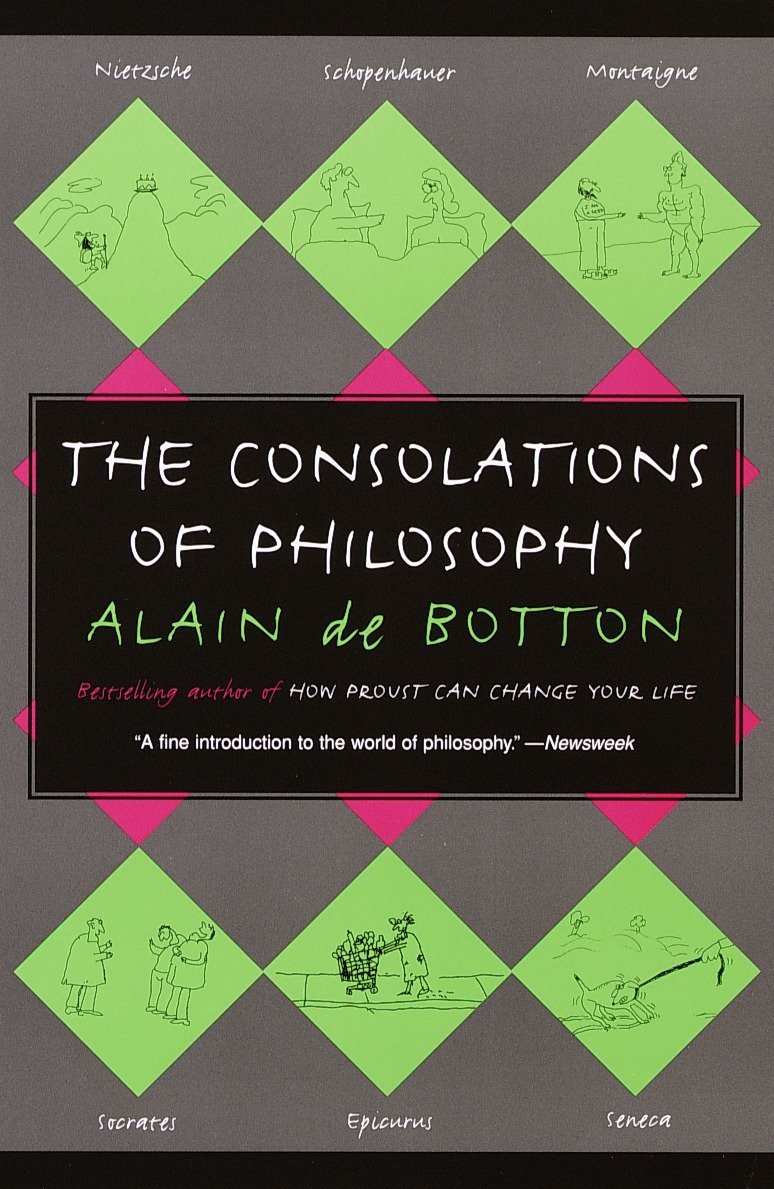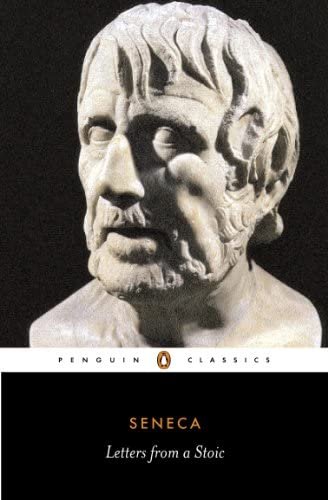The Consolations of Philosophy – by Alain de Botton
Date read: 9/8/18. Recommendation: 7/10.
An introduction to some of the greatest thinkers including Socrates, Epicurus, Seneca, Montaigne, Schopenhauer, and Nietzsche. Botton wraps each philosopher in the context of consolation for a different human struggle (Seneca = consolations for frustration). If you’re already into philosophy, it’s an interesting format you’ll find both strange and engaging. If you’re not, it provides an accessible introduction to the subject without requiring a college course on abstract thought.
See my notes below or Amazon for details and reviews.
My Notes:
Consolation for Unpopularity
Priority to be liked, rather than speak the truth. Laugh at modest jokes.
Socrates ultimate example of how to maintain confidence in an intelligent position which has met with illogical opposition.
Philosophy provided Socrates with convictions and rational (not hysterical) confidence when facing disapproval.
Philo, love; sophia, wisdom.
Not only the hostility of others that prevents us from questioning the status quo. Also, because we associate what is popular with what is right.
"We stifle our doubts and follow the flock because we cannot conceive of ourselves as pioneers of hitherto unknown, difficult truths." AB
Socrates encouraged us not to be unnerved by the confidence of people who fail to grasp complexities and formulate their views without rigour...established views don't necessarily emerge from faultless reasoning, but centuries of intellectual muddle.
Truth produced by intuition is like a statue without support.
Truth supported by reasons and an awareness of counterarguments ie like statue anchored by cables.
"If we are prone to burst into tears after only a few harsh words about our character or achievements, it may be because the approval of others forms an essential part of our capacity to believe we are right." AB
Two powerful delusions: we should always or never listen to the dictates of public opinion. Instead, strive to listen to the dictates of reason.
Consolation for Not Having Enough Money
Epicureanism suggests we are as bad at intuitively answering 'What will make me happy?' as 'What will make me healthy?'
Epicurus viewed philosophy as a tool to help us interpret distress and desire and help us avoid acting on immediate impulses and instead investigate rationality of our desires (rather than enter into mistaken schemes for happiness).
Sober analysis calms the mind.
Objects mimic in a material dimension what we require in a psychological one. The way we're enticed by commercial enterprises is by the sly association of superfluous objects with other, forgotten needs.
By understanding our true needs, excessive levels of consumption are destroyed by greater self-awareness and appreciation of simplicity.
"Mankind is perpetually the victim of a pointless and futile martyrdom, fretting life away inf fruitless worries through failure to realize what limit is set to acquisition and to the growth of genuine pleasure. [But at the same time] It is this discontent that has driven life steadily onward, out to the high seas..." -Lucretius
Consolation for Frustration
Expectations vs. Reality - We best endure those frustrations which we have prepared ourselves for and understand and are hurt most by those we least expected and cannot fathom.
Seneca's view of anger: Not from an uncontrollable eruption of passions, but from a basic error of reasoning.
-Frustrations are tempered by what we understand we can expect from the world.
-Greatest furies spring from events which violate our sense of the ground rules of existence.
"Rage is caused by a conviction, almost comic in its optimistic origins, that a given frustration has not been written into the contract of life." AB
"We must reconcile ourselves to the necessary imperfectability of existence." AB
"Not everything which happens to us occurs with reference to something about us." AB
Worst-case scenarios:
"If you wish to put off all worry, assume that what you fear may happen is certainly going to happen." Seneca
*bad things will probably happen, but they probably won't ever be as bad as we fear.
Wealth:
"Stop preventing philosophers from possessing money; no one has condemned wisdom to poverty." Seneca
-Stoicism (Seneca specifically) considers wealth a preferred thing. Not an essential thing or a crime.
"The wise man can lose nothing. He has everything invested in himself." Seneca
We might not be able to change certain events, but we are able to choose our attitude, which provides a sense of freedom.
Consolation for Inadequacy
"We ought to find out not who understands most but who understands best." Montaigne
"If I come across difficult passages in my reading I never bit my nails over them: after making a charge or two I let them be...If one book wearies me I take up another." Montaigne
-Wisdom doesn't require a specialized vocabulary, only makes an audience weary
-Writing with simplicity requires courage
"However modest our stories, we can derive greater insights from ourselves than from all the books of old." AB
Consolation for Difficulties
Pain is a natural, inevitable step on the way to anything good/fulfillment.
"The most fulfilling human projects appeared inseparable from a degree of torment, the sources of our greatest joys lying awkwardly close to those of our greatest pains." AB
Nietzsche was striving to correct the belief that fulfillment must come easily or not at all, a belief ruinous in its effects, for it leads us to withdraw prematurely from challenges that might have been overcome if only we had been prepared for the savagery legitimately demanded by almost everything valuable.
Philosophy = voluntary living in ice and high mountains
"The ice is near, the solitude is terrible–but how peacefully all things lie in the light! how freely one breathes! how much one feels beneath one!" Nietzsche
"Don't talk about giftedness, inborn talents! One can name all kinds of great men who were not very gifted. They acquired greatness, became 'geniuses' (as we put it) through qualities about whose lack no man aware of them likes to speak: all of them had that diligent seriousness of a craftsman, learning first to construct the parts properly before daring to make a great whole. They allowed themselves time for it, because they took more pleasure in making the little, secondary things well than the effect of a dazzling whole." Nietzsche
Endurance:
"Fulfillment is reached by responding wisely to difficulties that could tear one apart." AB
"Not everything which makes us feel better is good for us. Not everything which hurts may be bad." -AB



